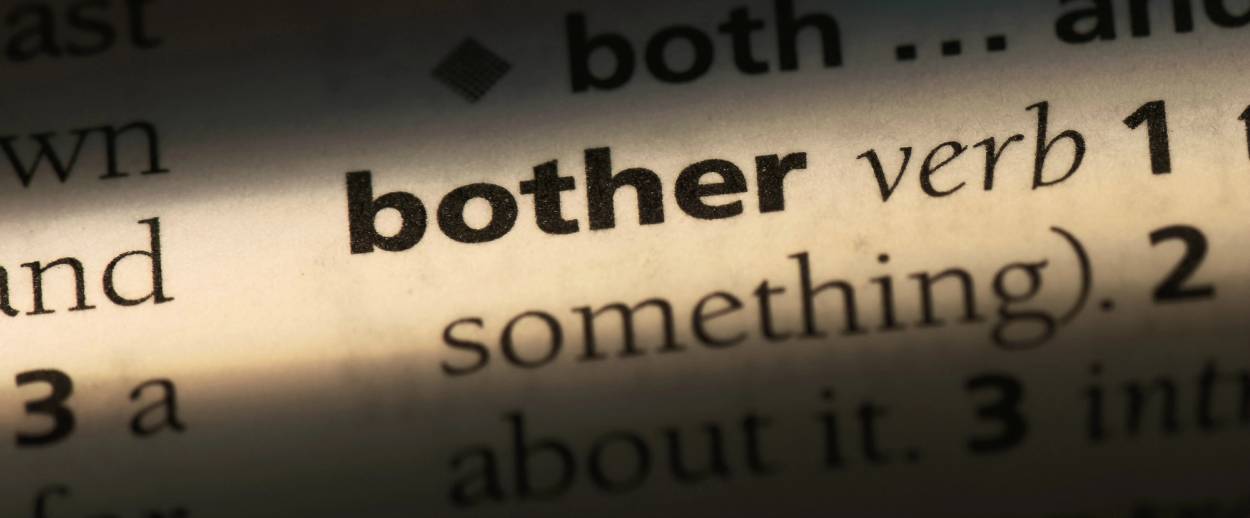In These Annoying Times, Here’s the One Yiddish Word You Should Know
Is anything mutcheh-ing you these days?




An opinion column about the U.S. administration’s strategy (the word used here loosely) toward Iran’s government recently appeared in the Orthodox English-language daily Hamodia under the title “Mutcheh-ing the Mullahs.” The columnist (full disclosure: it was I) was challenged by an expert proofreader (full disclosure: she is my wife) to explain the odd Yiddish verb.
It is, in fact, a most wondrous one, expressive, memorable, fun to say and full of appropriate invocations in these troubled times, as we are treated to a profusion of mutcheh-ing.
The closest English translation would be “bother,” “annoy,” or “harass.” But the Yiddish word is somehow better.
And so, while Mr. Trump is mutcheh-ing the mullahs, as he exulted in doing to an assortment of ethnicities and individuals over his campaign and his months so far in office, Mr. Mueller has been mutcheh-ing Mr. Trump. As has been Ms. Stormy Daniels, and her lawyer, Michael Avenatti.
And James Comey. And The New York Times. And a gaggle of late night gagmeisters.
As they say, or should: “Live by the mutcheh…”
The word might seem at first to be an entirely original Yiddish one, which would be something of a rarity, but the fact that it is used in Yiddish in a different, non-annoying, context as well may indicate that its root lies in German.
For the word can also mean something more akin to “strain” or “pressure,” as in: “Senator Foggybottom, hunched over his copy of the Congressional Record, mutchet zich to comprehend the legislation he introduced earlier that day.” (The zich means “himself”).
Or, “The press secretary mutchet zich to explain the president’s precise relationship to Michael Cohen.”
Or: “Despite his impressive consulting fees, Mr. Cohen claimed few assets, asserting that he mutchet zich just to make ends meet.”
Which leads us to our German candidate, the verb mühe (pronounced MOOyeh), which means, variously, “toil” or “with difficulty.” The German phrase mühe machen can mean either “to take the trouble,” or “to make trouble.”
Shades of mutcheh.
Truth be told, there’s another Yiddish word with a similar meaning to that of mutcheh, though somewhat closer to “goad” or “egg on”: tcheppeh. It has a literal meaning, “touch,” but with a menacing overtone of “bother,” “goad,” or, as the English colloquialism goes, “mess with.”
As in, “Tcheppeh nisht di tarantula.” (Come on. You can figure that one out yourself. And it’s darn good advice.)
Meandering back to mutcheh, though, if mühe is in fact its root, where did the “tch” come from? Well, that’s anyone’s guess. But it is a common syllable in a host of Yiddish words. And don’t kvetch about that answer as some sort of cop-out, because “kvetch” will just lend it support. And the tch does make mutcheh easier to say than mühe, and is so much more evocative.
But mühe does have something going for it. It is immortalized in the famous German quip: Eine kuh macht muh, viele kühe machen mühe. That is to say, “One cow makes a moo; many cows make trouble.”
Well, Germans find it amusing, okay?
Rabbi Shafran, whose latest book is “It’s All In The Angle” (Judaica Press), blogs at rabbiavishafran.com.